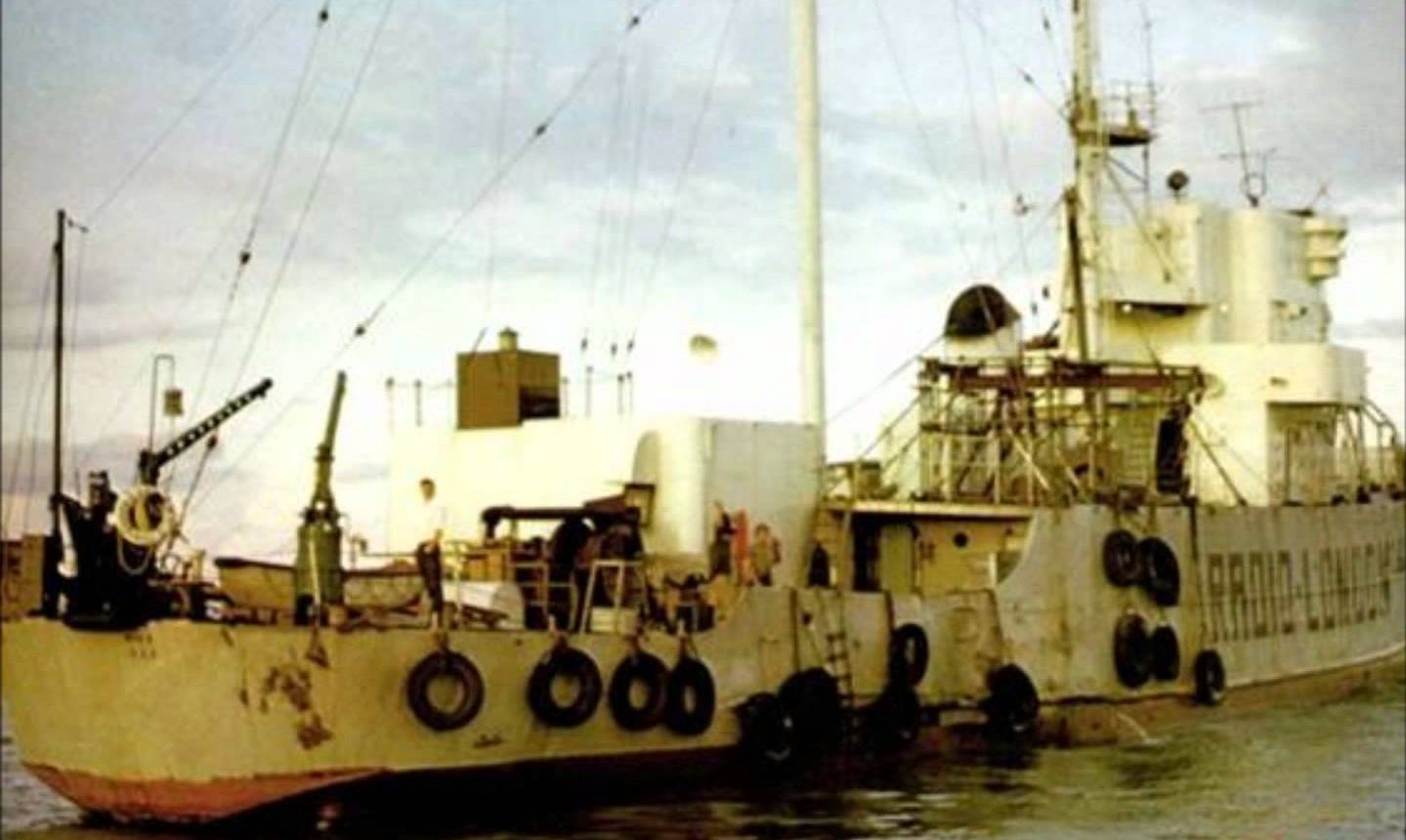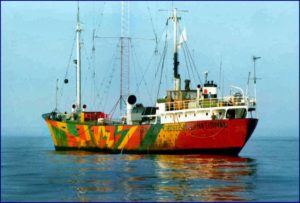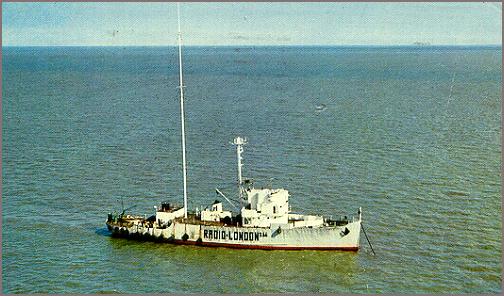Britain’s Pirate Radio Revolution
25 June 2018



 History,Music,Short Factual Stories
History,Music,Short Factual Stories

Britain’s (Pirate) Radio Revolution
Why Britain Experienced a Pirate Radio Revolution in the 1960’s
Back in 1942 when the Americans started to arrive in Britain to prepare for the invasion of France, they were somewhat underwhelmed by the state of British Radio.
With the outbreak of war in 1939, the BBC had taken all their existing radio stations off the air. In their place the BBC created the Home Service as the main wartime radio diet served up for the British people. The station concentrated on news, information and music. This included organist Sandy MacPherson filling in with hours of theatre organ music each day. There was nothing else to listen to because the BBC was the only UK broadcaster at that time.
Realising that they were not really satisfying demand, in early 1940 the BBC introduced the Forces Programme. This was a new station that broadcast drama, comedy, popular music, features, quiz shows and variety shows.
But when Americans started to arrive in Britain to join the war from 1942 onwards, they found the Forces Programme to be mundane and insufficient for their tastes which had been brought up on competitive and entertaining commercial radio. So, following criticism from none-other-than General Eisenhower himself, the BBC renamed the station, the General Forces Programme. They added popular American programmes like Charlie McCarthy, The Bob Hope Show and The Jack Benny Program. They also added daily American sports news – another novelty for the BBC.
Of course, in the UK this led to concerns about the Americanisation of the BBC, but the BBC discovered that British audiences were lapping up this new format.
The Light Programme
However, after the War when the Forces Programme effectively became the Light Programme, the BBC settled back into its rather staid natural environment. By the 1960’s, the Light Programme had not kept pace with the changing world. It was, by then, totally failing to provide the programmes demanded by a burgeoning young generation of British baby boomers.
The only alternative for that audience was Radio Luxembourg but it never really satisfied their demand. Their Medium wave reception was always poor as the station’s signal faded in and out. Many of their presenters sounded pseudo-American. Even their stalwart Tony Prince, who was from Oldham, never quite came across as a proper-Brit.
Pirate Radio
So the scene was set for a revolution in radio. The years between 1964 to 1967 became the hey-day of British Pirate Radio.
Suddenly the airwaves were full of programmes being broadcast in a manner never before heard in the UK. These stations included Radio Caroline which had two stations. Caroline North broadcast from a ship moored off the coast of the Isle of Man, and Caroline South from a ship off the Essex coast.
Caroline was joined by Swinging Radio England, Britain Radio, Fortress Radio, Radio Invicta, Radio City, King Radio, Radio Scotland, Radio 270, Radio 355 and numerous others that came and went during the 1960’s.
Radio London
But the most popular & successful of them all was Radio London often referred to as Big L. It was the radio station that would most influence changes in British broadcasting.
Based on the American Fab-Forty Format, Radio London used mainly British presenters who adopted American broadcasting techniques but not necessarily American accents. This forced the BBC, who were unaccustomed to competition, into a rapid re-think. The Light Programme was split into Radios One and Two. At the same time the Home Service was renamed Radio Four and the Third Programme became Radio Three.
The BBC hurriedly built presenter self-drive studios in the style of the Pirate Stations. BBC presenters had never before been expected to drive their own show! Additionally, the BBC created a jingle package for Radio One that was not dis-similar to Radio London’s.
The majority of the presenters hired by the BBC for their new Radio One station came from Radio London including Tony Blackburn, Kenny Everett and John Peel. With them came the sound of Radio London that was to influence the future sound of Radio One and other BBC radio stations for years to come.
Even though The Marine Offences Act in 1967 forced most of the Pirate Radio Stations to close the influence of Radio London would continue long after its demise. So how did Radio London become so important in this second American-inspired revolution for British radio?
Marine Offences Act
The basis of the Marine Offences Act was to make it illegal for a pirate ship to broadcast within the countries territorial waters which extends three miles out from the coastline. But of more significance was that it also made illegal the servicing of those ships from any British port and it now became illegal for British firms to advertise on such stations. This made the logistics of running a Pirate Radio operation too complicated and no longer viable.
But the reasons behind Parliament passing the Marine Offences Act was never truly believed by a vast swathe of the population:
- The Government claimed that Pirate Radio ships were a hazard to navigation. Really?
- The Government claimed that the frequencies used for transmission were against international agreements and were causing interference with the reception of other legitimate radio stations in Europe. While it was true that Pirate Radio stations had no right or agreement to use their frequencies, the fact remains that they were all on Medium Wave which does not have a long reach so interference with other station’s signals would have been minimum if at all.
- The Government claimed that Britain was a country that observed the law, that the Pirate Stations were breaking the law and therefore they had to be closed down. The only law that they appeared to be breaking was the BBC’s radio broadcasting monopoly.
Whilst the relationship between the British Government and the BBC has always been slightly peculiar, the Marine Offences Act is seen by many as a way of the government defending its own inadequate, monopolistic broadcasting institution, the BBC. Additionally, it has come to light since, that the BBC was so fearful of the success of the Pirates that they ran a dirty tricks campaign against them. They constantly monitored their output and fed anything unsavoury or controversial to politicians; they banned Pirate Radio presenters from appearing on the BBC and their own presenters from even mentioning the Pirates; and they lobbied leading performers of the time, like the Beatles and Cliff Richard, to embargo their own records on pirate stations.
The BBC also undertook research into the age profile of listeners to see how many were of voting age because the government was fearful of a voter backlash if they were to shut them down. This came in a landslide victory for the Conservatives in the GLC (Great London Council) Elections in 1967 when Pirate Stations broadly and publicly supported the Conservatives, who were mainly unopposed to the Pirates, against the incumbent Labour administration who were largely opposed to them.
In the end, the BBC pulled back from any open campaign against the Pirates for fear of feeding their own unpopularity. But, in shutting down the pirates, the Government created a situation where the BBC would take the best of Pirate Radio (including its best presenters), and then spend ten years bedding it down before Independent Radio Stations were allowed on air as the successors of Pirate Radio.
The Pirate Resurgence
 If the British Government thought that the Marine Offences Act in 1967 would see the end of Pirate Radio, they were wrong. Radio Caroline continued to defy the ban and its longevity has made it the by-word for Pirate Radio Stations.
If the British Government thought that the Marine Offences Act in 1967 would see the end of Pirate Radio, they were wrong. Radio Caroline continued to defy the ban and its longevity has made it the by-word for Pirate Radio Stations.
Then in 1970 a new station came on the scene, Radio North Sea International or, as it was more commonly known, RNI. For five years this station, moored in the North Sea, transmitted to Britain, Germany and the Netherlands with each country taking a proportion of each 24 hours with programmes in their own language.
This station never had the dramatic effect upon British broadcasting as Radio London, nor was its programming and presentation to the standard set by Radio London. But the events that surrounded this station were sufficiently dramatic to make the station a household name in the UK.



Leave a Comment
You must be logged in to post a comment.